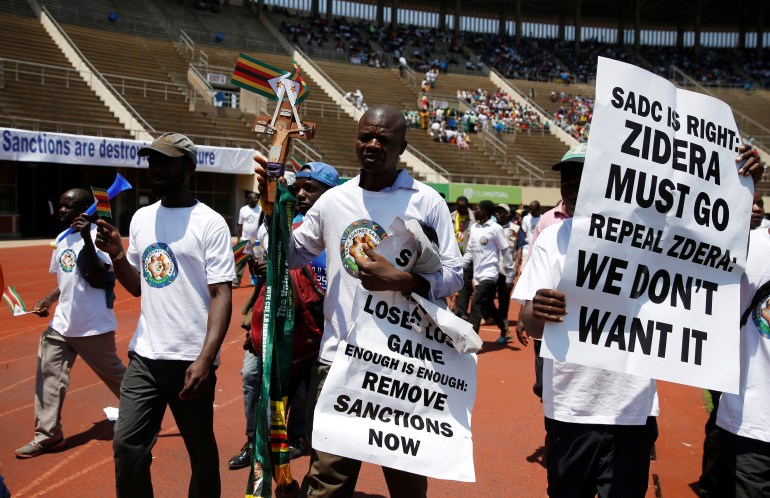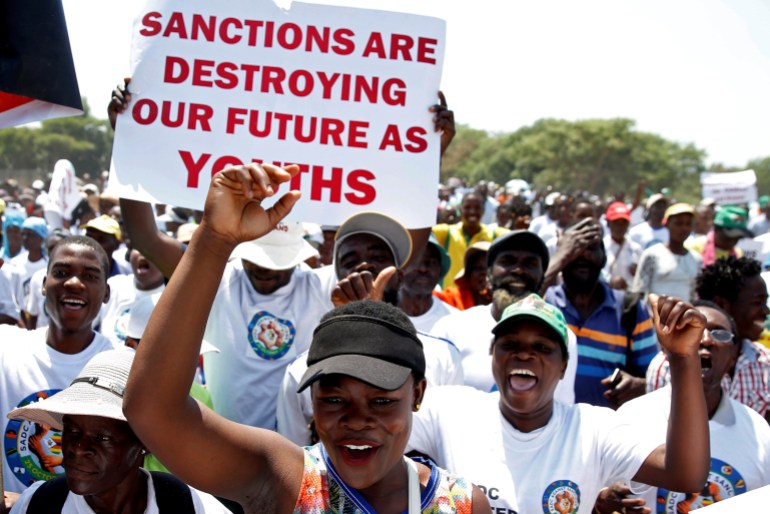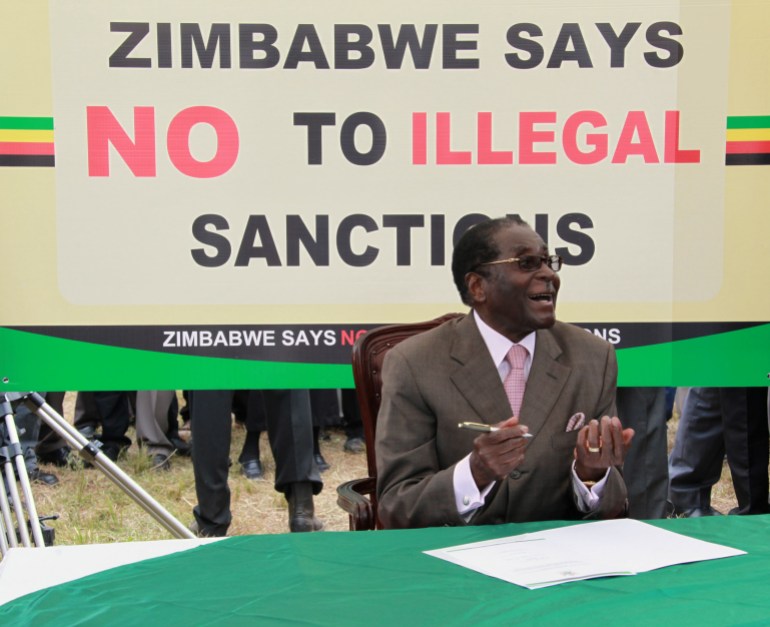In March, the US imposed new sanctions on 11 Zimbabwean people, together with President Emmerson Mnangagwa and his spouse, and different officers, following allegations of corruption and human rights abuses. It additionally positioned sanctions on three companies – additionally due to alleged corruption, human rights abuses and election rigging.
A press release from Mnangagwa’s workplace described the accusations as “defamatory”. It added that they amounted to a “gratuitous slander” towards Zimbabwe’s leaders and other people.
The transfer got here after a assessment of US sanctions which have been in place since 2003. Any more, sanctions on Zimbabwe will apply to people and companies listed underneath the World Magnitsky Act of 2016. This Act authorises the US authorities to sanction international authorities officers worldwide for alleged human rights abuses, freeze their belongings, and ban them from coming into the US on unofficial enterprise.
By switching to the Magnitsky Act to cowl sanctions in Zimbabwe, the US stated fewer people and companies will obtain sanctions than have till now. “The changes we are making today are intended to make clear what has always been true: our sanctions are not intended to target the people of Zimbabwe,” Deputy Treasury Secretary Wally Adeyemo stated.
Rutendo Matinyarare, a vocal authorities supporter who leads the Zimbabwe Anti-Sanctions Motion, welcomed the change to the sanctions regime. “The real sanctions are gone now, so no more excuses. Let’s build the country now,” he tweeted on X, previously Twitter.
𝐍𝐎 𝐄𝐗𝐂𝐔𝐒𝐄𝐒. 𝐋𝐄𝐓’𝐒 𝐍𝐎𝐖 𝐁𝐔𝐈𝐋𝐃.
The actual sanctions are gone now, so no extra excuses. Let’s construct the nation now.
The sanctions on the President, VP, First Woman, Minister of protection and our superb enterprise folks needs to be fought by way of the perfect authorized minds… pic.twitter.com/BQAysQlRdc
— Rutendo Matinyarare (@matinyarare) March 8, 2024
Why does the US impose sanctions on Zimbabwe?
The US says it goals to advertise democracy and accountability and handle human rights violations in Zimbabwe.
“We continue to urge the Government of Zimbabwe to move toward more open and democratic governance, including addressing corruption and protecting human rights, so all Zimbabweans can prosper,” David Gainer, the US performing deputy assistant secretary of state stated.
The US can also be the most important supplier of humanitarian support to Zimbabwe, offering greater than $3.5bn in support from the nation’s independence from British colonial rule in 1980 till 2020.
Do sanctions hurt Zimbabwe’s economic system?
Final 12 months, Zimbabwean Vice President Constantino Chiwenga stated the nation had misplaced greater than $150bn due to sanctions imposed by the European Union and the US.
Alena Douhan, UN Particular Rapporteur on unilateral coercive measures, who visited the nation in 2021, stated the sanctions “…had exacerbated pre-existing social and economic challenges with devastating consequences for the people of Zimbabwe, especially those living in poverty, women, children, elderly, people with disabilities as well as marginalised and other vulnerable groups”.
A 2022 Institute of Safety Research Africa (ISS) report discovered that buyers are likely to keep away from Zimbabwe due to the “high-risk premium” positioned on the nation because of the focused US sanctions.
Some worldwide banks have additionally minimize ties with Zimbabwean banks as a result of the US Workplace of International Property Management (OFAC) penalises US corporations or people who do enterprise with any sanctioned particular person, entity or nation.

Are sanctions the one factor holding again the economic system?
Zimbabwean economist Present Mugano stated that corruption, much more than sanctions, holds Zimbabwe again. “Zimbabwe can weaken the possible effects of so-called sanctions, but corruption is the major problem,” he informed Al Jazeera.
He added that the US and others have by no means imposed commerce sanctions on Zimbabwe. “We can trade with anybody, including the Americans and the Europeans; the measures were financial and didn’t affect trade.”
Eddie Cross, an economist who advises the federal government and has written a biography of President Mnangagwa, pointed to Transparency Worldwide figures displaying that corruption has value Zimbabwe $100bn since independence. “That’s more than $2.5bn a year, but combining the two [corruption and sanctions] is enormous.”
Nonetheless, the US nonetheless operates the Zimbabwe Democracy and Financial Restoration Act (ZIDERA), which the Congress handed in 2001. Whereas the US says this isn’t a set of sanctions, ZIDERA prevents Zimbabwe from accessing loans and funding from worldwide monetary establishments, such because the IMF and the World Financial institution, which consultants say hampers its potential to develop economically. Some establishments had stopped lending to Zimbabwe earlier than ZIDERA due to its poor document of servicing loans.
Cross stated consultants estimate that banks lose about $1bn yearly in greater financial institution prices due to ZIDERA. “ZIDERA has been in place for 23 years, and a billion dollars a year could have easily settled our national debt.” He added that the extra prices come up when native banks undergo banks aside from the common correspondent banks, which typically refuse to deal straight with Zimbabwean banks for concern of being penalised by the US authorities.
Among the many circumstances Zimbabwe has to satisfy for the repeal of ZIDERA is the restoration of the rule of legislation, the holding of free and honest elections, a dedication to equitable, authorized and clear land reform – together with the compensation of the previous farmers who misplaced their land to the nation’s land reform programme – and the army and police withdrawing from politics and authorities.
Do sanctions work?
Cross argued that sanctions don’t deal with corruption. He questioned why the US doesn’t impose sanctions on nations like China, which he says is undemocratic. “They allow China free access to international financial markets, Western technology and international markets, and they allow China to borrow enormous sums of money at very low interest rates with which they have been developing their infrastructure and economy.”
Moreover, a 2022 Institute of Safety Research Africa (ISS) report concluded that sanctions have largely failed to enhance democratic behaviour among the many ruling elites in Zimbabwe. Human rights violations persist and political freedoms stay severely curtailed.
Amnesty Worldwide commonly highlights the threats to freedom of expression, arrests of journalists and harassment of members of the opposition police forces and members of the ruling ZANU-PF get together.
Moreover, an Al Jazeera investigation final 12 months discovered Zimbabwe’s authorities was utilizing smuggling gangs to promote gold price a whole lot of hundreds of thousands of {dollars}, serving to to mitigate the consequences of sanctions. Gold is the nation’s largest export.
Who else imposes sanctions on Zimbabwe?
The UK and European Union additionally imposed comparable sanctions on Zimbabwe, giving the identical causes because the US. They’ve whittled down the measures through the years.
Nonetheless, as of February, an embargo on the sale of arms and tools that the federal government could use for inner repression stays in place. The EU and UK additionally nonetheless freeze belongings held by state-owned arms producer, Zimbabwe Defence Industries.

What do Zimbabweans consider the sanctions?
Members of the Broad Alliance In opposition to Sanctions have been camped exterior the US embassy in Harare since 2019, demanding an finish to all sanctions, together with ZIDERA.
Sally Ngoni, a pacesetter of the group, stated: “All these measures are a tool to effect regime change in Zimbabwe; they want our government to fail; it’s punishment for reclaiming our stolen land from the whites.” She was alluding to the typically violent fast-track land reform that noticed white farmers lose their farms ostensibly for the resettlement of landless Black folks launched in 2000.
Nonetheless, different Zimbabweans assist the sanctions, saying they need to stay in place till the federal government stops harassing and silencing opposition figures. “The measures affect those listed and not the generality of Zimbabweans,” Munyaradzi Zivanayi, an unemployed graduate, informed Al Jazeera.
Some consider eradicating sanctions would assist to show authorities deficiencies. “The removal of all sanctions will expose the government’s incompetence as they cannot use the sanctions as an excuse any more,” stated Harare accountant Joseph Moyo.
How have Zimbabwe’s leaders responded to sanctions?
The late President Robert Mugabe referred to as sanctions an “interference in the affairs of Zimbabwe,” a sovereign state. In response, he declared a “look East” coverage, which means Zimbabwe would strengthen financial ties with nations reminiscent of China and Russia, which he thought to be extra supportive. He additionally solid stronger ties with different sanctioned nations, together with Belarus and Iran.
After the army eliminated Mugabe in 2017, Mnangagwa, the brand new president, adopted a “friend to all and enemy to none” method. This noticed the brand new authorities vigorously pursue re-engagement with estranged nations.
In 2019, it paid a whole lot of 1000’s of {dollars} to Ballard Companions – a lobbying agency run by a Trump marketing campaign fundraiser – after the US authorities renewed sanctions on 141 people and entities, citing continued human rights abuses and corruption.
Regardless of this allure offensive, it’s nonetheless US coverage that Zimbabwe has not addressed the problems for which sanctions have been imposed. In addition to corruption, US Secretary of State Antony Blinken, in an announcement saying the brand new sanctions, famous: “Multiple cases of abductions, physical abuse, and unlawful killing have left citizens living in fear.”

How have sanctions affected Zimbabwe-US relations?
Sporadic verbal outbursts, accusations and private assaults characterise the difficult relationship between the 2 nations.
They took one other hit in February when the US protested towards the deportation of United States Company for Worldwide Growth (USAID) officers and contractors.
Zimbabwe’s model of the incident is that the 4 people entered the nation with out notifying authorities and held “unsanctioned covert meetings”. The Sunday Mail, a state-controlled weekly, reported that the conferences have been held “to inform Washington’s adversarial foreign policy towards Zimbabwe”.
The US asserted that the USAID personnel have been within the nation legally and that the Zimbabwean authorities knew of their presence and mission.

